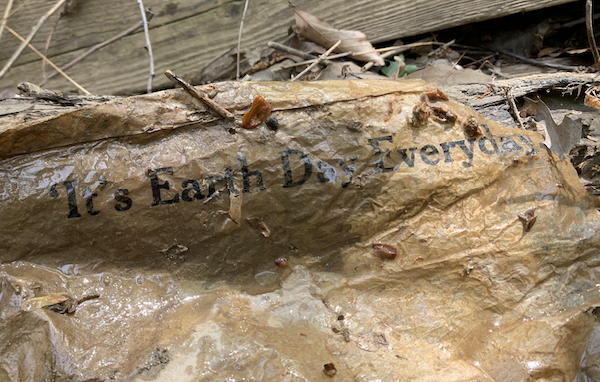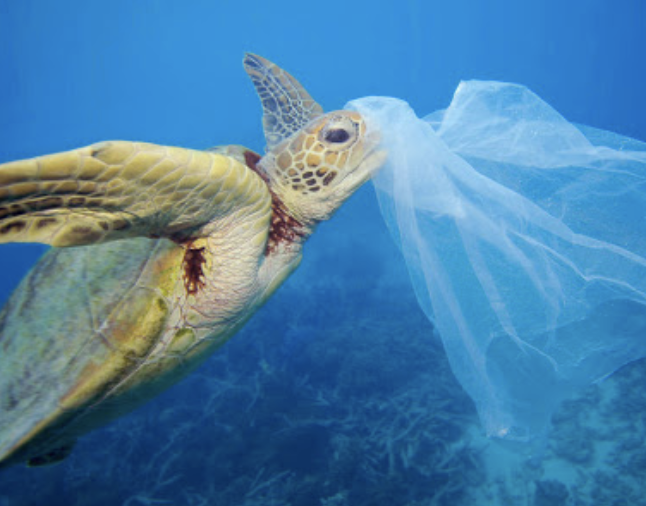



Single-use Plastic Bags: Common Litter in Virginia
This web page by Clean Virginia Waterways includes:
IS YOUR LOCAL GOVERNMENT PLANNING ON IMPLEMENTING A FEE ON PLASTIC BAGS?
If so, please let us know so we can update our list of bag fees in Virginia.
Also visit LitterFreeVA.org for updates on legislation that is focused on decreasing plastic pollution, litter, and marine debris in Virginia.
1. DATA ABOUT PLASTIC BAG LITTER IN VIRGINIA
One of the most problematic sources of plastic pollution in Virginia comes from single-use plastic bags.
From 2015 to 2020, plastic bags were, on average, the 4th most common type of litter found during the statewide International Coastal Cleanup in Virginia.
Volunteers in the International Coastal Cleanup (ICC) not only removed tens of thousands of plastic bags from Virginia's environment over the years, they also recorded data that shows bags are in the "Top 5" most commonly littered item. Data are collected via a paper form (download the Data Card here) or the CleanSwell App for smartphones. The ICC is organized annually by Clean Virginia Waterways in conjunction with hundreds of local groups and thousands of volunteers. Learn more about the ICC in Virginia.
| Top Ten Litter Items — Virginia (statewide) 2015-2020 | |||
| Item | Total | Percent of all litter | |
| 1 | Cigarette Butts | 116,025 | 19.01% |
| 2 | Beverage Bottles (Plastic) | 68,264 | 11.19% |
| 3 | Food Wrappers (candy, chips, etc.) | 68,073 | 11.15% |
| 4 | Grocery Bags (Plastic) | 43,747 | 7.17% |
| 5 | Beverage Cans | 33,316 | 5.46% |
| 6 | Other Plastic Bags | 30,225 | 4.95% |
| 7 | Bottle Caps (Plastic) | 30,185 | 4.95% |
| 8 | Beverage Bottles (Glass) | 25,540 | 4.18% |
| 9 | Cups, Plates (Plastic + Foam) | 24,989 | 4.09% |
| 10 | Take Out/Away Containers (Plastic + Foam) | 24,409 | 4.00% |
Plastic Bag Litter Where you Live: Always in the "Top Ten"
According to data collected by volunteers in the 2019 International Coastal Cleanup in Virginia, this is how plastic grocery bags ranked in your county:
"It is difficult to walk along Accotink Creek and ever be out of sight of the tattered remains of littered plastic bags, clinging to the branches as they slowly shred into tiny particles that will plague us forever." --Philip Latasa, Friends of Accotink Creek, Fairfax, Virginia |
 |
In 2020, the Virginia General Assembly approved a bill (SB 11) giving local communities the ability to place a 5-cent fee on single-use plastic bags. The fees will support environmental cleanups and the provision of reusable bags while also decreasing the number of plastic bags being used...and ending up in our environment. Fees on bags in other communities have greatly decreased the amount of litter from plastic bags.
The VA Dept of Tax has guidelines available for the VA Disposable Plastic Bag Tax. View the guidelines here: https://www.tax.virginia.gov/guidelines-virginia-disposable-plastic-bag-tax
Where will the revenues go? Under this bill, "...every retailer that collects a tax imposed by a county or city under this article shall be allowed to retain two cents ($0.02) from the tax collected on each disposable plastic bag" until 1-1-23. After that, "...every retailer that collects a tax imposed by a county or city under this article shall be allowed to retain one cent ($0.01) from the tax collected on each disposable plastic bag."
All revenue accruing to the county or city from a tax imposed under the provisions of this article shall be appropriated for the purposes of environmental cleanup, providing education programs designed to reduce environmental waste, mitigating pollution and litter, or providing reusable bags to recipients of Supplemental Nutrition Assistance Program (SNAP) or Women, Infants, and Children Program (WIC) benefits.
3. WHAT LOCAL GOVERNMENTS ARE DOING:
Visit our "History of Litter Legislation in Virginia" spread sheet for updated information
Localities where the disposable plastic bag tax currently applies:
- Alexandria City
- Arlington County
- Fairfax County
- Falls Church City
- Fredericksburg City
- Loudoun County
- Roanoke City
- Albemarle County, beginning January 1, 2023
- Charlottesville City, beginning January 1, 2023
- Fairfax City, beginning January 1, 2023
Source: https://www.tax.virginia.gov/disposable-plastic-bag-tax
4. DO FEES ON PLASTIC BAGS WORK TO REDUCE LITTER? LESSONS LEARNED FROM OTHER BAG BILLS
Washington DC: Bag fees decreased litter, decreased the use of plastic bags, and raised funds to combat litter. When Washington D.C. enacted a "Skip the Bag, Save the River" bag bill, it worked closely with a local environmental education organization to make sure the focus was on:
They measured litter before and after, and also measured acceptance by businesses and residents. Revenues from the fee go to The Anacostia River Clean Up and Protection Fund and have been used to implement a variety of educational, trash capture, and stream restoration projects throughout the Anacostia Watershed. In addition, these funds are used for the purchase and distribution of reusable bags to low-income and elderly populations throughout the District. Learn more: this report includes lots of stats about this successfully program.
Fees reduced plastic bag litter in Washington D.C.:
According to several independent studies, in less than five years bag usage in DC dropped by more than 50%.
Data collected during the Alice Ferguson Foundation's annual Potomac River Watershed Cleanup showed a 72% decrease in bags collected in the years before the fee versus after.
Download data and reports here:
The data proves the DC bag fee is working
Fees reduced plastic bag litter in California:
"Prior to the statewide bag ban, California retailers were distributing an estimated 13.8 billion bags per year, and plastic film recycling rates were only at 5 percent. At the annual Coastal Clean-Up Day, plastic bags used to be one of the leading sources of litter. Plastic bags accounted for 7.4 percent of all litter — only cigarette butts and fast food packaging were more prolific.
"By 2016, more than 40 percent of California had enacted plastic bag bans, and the corresponding litter rate had been reduced by 66 percent. Data from the September 2017 clean-up shows that plastic bag litter has now dropped by 72 percent since 2010, down to less than 1.5 percent of litter collected.
"Phasing out of plastic bags is proving to be a highly effective measure against pollution — a sure success for California communities and wildlife. From: https://www.stocktonrecycles.com/plastic-bag-ban-review/.
A May 26, 2021 editorial in the Richmond Times Dispatch by Chris Gentilviso states: "Plastic bag taxes have to generate a real behavior change among Virginians. They are just one of several solutions that should be in motion to reduce our dependency on plastic and create a more sustainable environment." He also quotes a Duke paper that said policies tended to be “...more effective when paired with public awareness or educational campaigns..."
5. Impacts that plastic bag litter has on wildlife, habitat, and agricultural fields
Deadly to Wildlife
Plastic bags are among the deadliest types of ocean trash. A 2015 study revealed that plastic bags ranked #3 in the Top 5 list of deadliest ocean trash to key wildlife populations. In 2020, a report from Oceana found that plastic bags were among the deadliest types of plastic pollution in the ocean. Marine animals often mistake plastic bags for food, causing entanglement, asphyxiation, digestion blocking, and death.
 Sea turtles mistake plastic bags for their favorite food -- jelly fish. Photo by World Wildlife Fund.
Sea turtles mistake plastic bags for their favorite food -- jelly fish. Photo by World Wildlife Fund.
Threat to Human Health
Extracting fossil fuels for plastic production and toxins released as a byproduct of plastic bag manufacturing can cause respiratory, carcinogenic, neurological, and reproductive health issues. Over time, plastic bags break up to become microplastics, which are fragmented plastic pieces that are 5mm or smaller. These plastic pieces can be consumed by fish and other wildlife, and ultimately end up in the food web.
Economic Impacts
In the United States, it costs approximately $9 million dollars annually to clean plastic bag litter. When plastic bags drift, they are hazardous to the agriculture industry because they can harm livestock and crops.
COTTON FARMERS are especially impacted by plastic bag litter! When a plastic bag enters cotton pickings, farmers must pay additional labor to remove the shredded plastic bag pieces. Additionally, plastic bags disrupt the recycling process because they contaminate the stream of recycling, which adds costs and wasted work
Background: Plastic bags were first introduced to grocery stores in the late 1970s to increase convenience, and now approximately four trillion plastic bags are used worldwide per year. In the United States alone, approximately fourteen billion bags are used annually, and only 1% to 3% of them get recycled.
Due to the severity of this problem, plastic bag debris reduction has been made a priority in the Virginia Marine Debris Reduction Plan. Plastic bag debris supports the calls for laws, policies, and behavior-change campaigns.
Sources:
Clean Virginia Waterways, data from the International Coastal Cleanup in Virginia. Also available from the Ocean Conservancy’s online open access database.
Cole, J. 2019. Reducing Litter Pollution in Virginia’s Waterways. Virginia Conservation Network. http://www.vcnva.org/reducing-litter-pollution-invirginias-waterway
Cronin, M. 2021. Building Better Bag Behaviors: Reducing the Charlottesville Area’s Reliance on Plastic Bags. University of Virginia Frank Batten School of Leadership and Public Policy.
Daily Press, Feb 5, 2015. Bill letting local cities and counties ban plastic bags may be boon for cotton farmers. View it: https://www.dailypress.com/news/dp-nws-isle-wight-politics-plastic-bag-ban-cotton-20150204-story.html
Ocean Conservancy. 2020. Trash Information and Data for Education and Solutions (TIDES). https://www.coastalcleanupdata.org/
O’Hanlon, M. 2020. With Cotton Harvest Underway, Farmers Fear Grocery Bags, Plastic Contamination. Victoria Advocate. https://www.victoriaadvocate.com/news/local/with-cotton-harvest-underway-farmers-fear-grocery-bags-plastic-contamination/article_9f8c90b0-c438-11e9-9c61-03c92ae351a7.html
Parker, L. 2019. The world’s plastic pollution crisis explained. National Geographic. https://www.nationalgeographic.com/environment/habitats/plasticpollution
Smith, M., Love, D. C., Rochman, C. M., & Neff, R. A. (2018). Microplastics in seafood and the implications for human health. Current environmental health reports, 5(3), 375-386.
Virginia Department of Tax https://www.tax.virginia.gov/disposable-plastic-bag-tax
Waste Management Northwest. 2021. Guidelines – Plastic vs. Paper Bags. http://www.wmnorthwest.com/guidelines/plasticvspaper.htm; Penn State University. 2021. Tax the Plastic -Statistics - Plastic Bags. https://sites.psu.edu/taxtheplastic/statistics-3/.
Wilcox, C., Mallos, N. J., Leonard, G. H., Rodriguez, A., & Hardesty, B. D. 2016. Using expert elicitation to estimate the impacts of plastic pollution on marine wildlife. Marine Policy, 65, 107-114. For chart, see https://oceanconservancy.org/trash-free-seas/take-deep-dive/threat-rank-report/.
==================================================================
Thank you for visiting our web page! Please send updates to cleanva@longwood.edu. Also visit LitterFreeVA.org for updates on legislation that is focused on decreasing plastic pollution, litter, and marine debris in Virginia.
